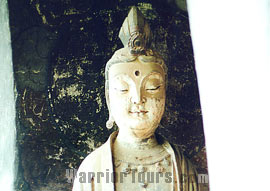Sui Dynasty (581 - 618)

As one of the ephemeral dynasties in Chinese history, the Sui Dynasty, which existed for only 38 years, was established by Yang Jian in 581. Yang Jian was also named Emperor Wendi, and was a relative of the Northern Zhou empress. Chang'an ( Xian today) was the capital and Luoyang City was the 'support capital'.
During the previous rule of Emperor Xuandi, the ruling group of the Northern Zhou Dynasty split internally. State politics were in disorder, people were suffering in their lives, and social contradictions were intensified. Because of this situation, generals of the Han people seized the opportunity to take over the regime with Yang Jian as the leader. In 580, Emperor Xuandi died of an illness, and Emperor Jingdi inherited the throne. Emperor Jingdi was then only eight years old, so Yang Jian assisted him as his Prime Minister and controlled the military power of the Northern Zhou. In 581, Yang Jian dethroned Emperor Jingdi, and established the Sui Dynasty. Eight years after ascending to the throne, Yang Jian destroyed the Chen Dynasty in southern China, and brought about the reunification of the whole of China.
However, Emperor Wendi made a mistake in selecting his successor. He was cheated by his second son Yang Guang who tried his best to behave well to get his father's recognition and succeeded in the end. After ascending to be the crown prince, Yang Guang killed his father and elder brother, and soon afterward came to the throne himself, and was named Emperor Yangdi. Following in the footsteps of King Zhou of the Shang Dynasty (16th - 11th century BC), Emperor Yangdi was another tyrant in Chinese history. After coming to the throne, he abused workers and financial resources. He requisitioned two million laborers per month to construct the Grand Canal, the Great Wall, and the eastern capital - Luoyang. Meanwhile, he went on expeditions to gain power in Korea three times, but failed each time. He traveled throughout China and made three voyages by ship to Jiangdu (Yangzhou City, Jiangsu Province today). Years of wars and Emperor Yangdi's immoderate expense severely weakened the state power, and brought the people much suffering. As a result, peasant uprisings broke out one after another. In 618, Emperor Yangdi was killed by his followers, and the Sui Dynasty ended.
To consolidate the regime, Yang Jian carried out a series of reforms in politics, economy, and military, and made great progress in foreign relations.
![]() Politics
Politics
In politics, Emperor Wendi practiced 'the System of Three Cabinets and Six Departments' in the central government. The three cabinets were: Neishi Sheng - the legislative bureau which was the policy making organ of the state in charge of drafting out orders and deciding organizations; Menxia Sheng - the Chancellery of the state which was the deliberation organ of the state; and Shangshu Sheng - the executive bureau which was the administrative organ of the state. The six departments were with Libu (personnel), Hubu (revenue), Libu (rites), Bingbu (war), Xingbu (justice) and Gongbu (works), which were all set up under the Shangshu Sheng to deal with daily affairs. In the local government, he simplified the three-grade system - state, prefecture and counties into a two-grade system, carrying out 'the System of States and Counties'. By doing so, he redressed the overfull organization abuses, improved political corruption, and saved government expenditures. In addition, he also ordered that local government officials must be assessed every year, that their term of service at the same place couldn't exceed three years, and that the officials mustn't be from other places. All these measures helped to strengthen the central government's control over the local places, and stopped the local depots from monopolizing the local powers.
At the same time, in selecting government officials, he prescribed that every state had to select three excellent candidates whatever family background they were born to, and send them to the central government every year. Those eligible people would be appointed as officials after the government examinations. That was the beginning of 'the Imperial Examination System'.
Additionally, Emperor Wendi ordered Gao Wan to make new state codes based on the old state rules of Northern Qi and Northern Zhou. In 583, he let Su Wei adjust the codes again, and then Kaihuang Codex was produced. The book was divided into 12 volumes, in which there were 500 punishments subdivided into five kinds and 20 grades and some abominations like scourging and splitting were abolished. Kaihuang Codex laid the groundwork for the codes of the later dynasties.
![]() Economy
Economy
In economy, he ordered the rectification of the household register, checked the population, carried out a land equalization system, and adjusted the taxes and conscript labor. Meanwhile, he ordered to coin standard 'Wuzhu' coins, and standardized bronze measuring bucket and iron rulers, which created good conditions for the increase of the economy.
In order to restore the agriculture production and strengthen the state water transport, Emperor Wendi had 'Guangtong Canal' constructed to bring the water in the Weihe River into Tongguan Pass in 584. In 605, Emperor Yangdi, son of Yang Jian, ordered the building of a grand canal running north and south. The Grand Canal centered in Luoyang was divided into four sections – Yongji Canal, Tongji Canal, Hangou Canal and Jiang Nan He, with a total length of four to five thousand li (1243 to 1553 miles). It was the artery of communications between south and north, leading to Zhuojun ( Beijing today) in the northeast and getting to Yuhang ( Hangzhou today) in the southeast.
![]() Military
Military
In the military, Emperor Wendi reformed the Fubing System. Before, Fubing were the professional soldiers at that time who were controlled by the generals; they weren't listed in the household booklets of the local states, and their family members also lived in the army with them. After the reform, those army people and their family members were both recorded in the name list of the army and household booklets of their local states; they could get their due farm land and engage in farming at peace time; they just took turns to guard the capital, and carried out their task on the stipulations.
![]() Foreign Relations
Foreign Relations
In foreign relations, the Sui Dynasty often went on punitive expeditions against the Turkic people in the north, and finally forced them to surrender. The Tuguhun group who lived in the area between Gansu and Qinghai Provinces today often invaded the Sui Dynasty in the beginning. In 596, Emperor Wendi let Princess Guanghua marry Tuguhun Khan to improve the relations between them. In 608, Emperor Yangdi defeated Tuguhun, and set four prefectures there. Then, Emperor Yangdi sent Zhu Kuan and He Man to attack Liuqiu (Taiwan Province today) twice.
In addition, the Sui Dynasty also made great advances in natural science and art. The noted astronomer Liu Zhuo wrote Huang-ji Calendar, in which the lunisolar precession he worked out was almost the same as that of modern times. Famous artisan Li Chun then designed and constructed the Zhaozhou Bridge which is the most ancient stone bridge in existence, enjoying the fame as 'the First Bridge in the World'. Emperor Yangdi ordered the compilation of Quyu Tuzhi which consisted of 1200 volumes. The book was a geographical magazine excellent in both pictures and literary compositions, which played an important role in the developing history of geography.

